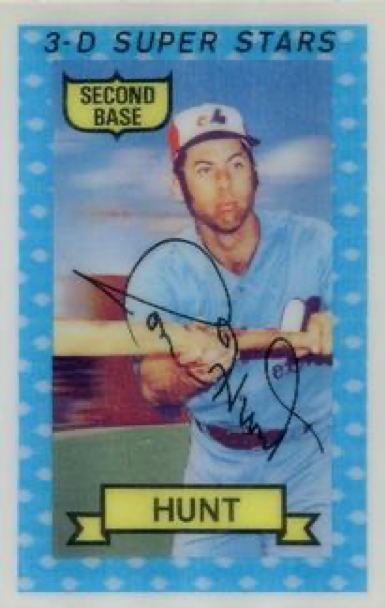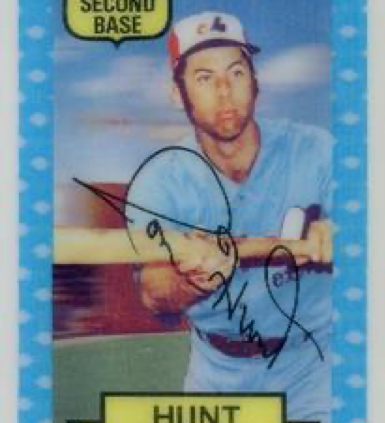May 15, 1974: First-place Expos squeak out win in ninth
 The phrase “first-place Montreal Expos” still had a novel ring when the Expos met the Philadelphia Phillies on the night of May 15, 1974. That season was Montreal’s sixth in the National League, and the first in which the Expos held first place at any point after the end of April.
The phrase “first-place Montreal Expos” still had a novel ring when the Expos met the Philadelphia Phillies on the night of May 15, 1974. That season was Montreal’s sixth in the National League, and the first in which the Expos held first place at any point after the end of April.
Gene Mauch’s Expos entered the day with a slim mathematical lead over Philadelphia in the NL East Division. The Phillies had played 32 games, the Expos only 24, but the Canadian team’s .542 winning percentage and 13-11 record put it ahead of the Phillies’ .531 winning percentage and 17-15 record. The Expos were unable to play nine early-season games because of rain and wet grounds and did not finish making up these early washouts until September 25.
Montreal’s dominance over the Phillies accounted for part of their rise to the top. Coming into the game, the Expos had won 10 of their last 11 matchups against the Phillies, including seven straight – a streak going back to the previous August 31. Some observers called it the “Mauch Mystique,” suggesting that Montreal’s manager held a psychological advantage over the team he managed from 1960 to 1968.1
The Expos had struggled of late, going 2-9 on a West Coast swing between April 23 and May 8, but bounced back by winning two games from St. Louis and the first of a three-game set with Philadelphia. Danny Ozark’s Phillies followed a similar trajectory, going 5-9 on a West Coast road trip and then perking up back East with a three-game sweep of the struggling Pittsburgh Pirates.
Mauch gave the start to right-hander Steve Renko, who entered the game with a 2-4 record and a 4.89 ERA. Ozark countered with righty Dick Ruthven, who was 2-1 with a 3.12 ERA. Neither pitcher had faced the other team that season. Both pitchers battled wildness. In five previous major-league seasons, Renko had walked 100 or more batters three times, and he led the NL in wild pitches in 1974 with 19. Meanwhile, Ruthven ended the season with 116 walks given up, third-most in the league.2
The Expos’ lineup incorporated one significant shift. Rising rookie Jim Cox had pushed 33-year-old veteran Ron Hunt out of the starting second-base job. Hunt batted leadoff and played third base; 1974 was the only one of his 12 big-league seasons in which he played more games at third than second. Neither player was thriving in the new arrangement. Hunt was hitting .239 and had yet to collect an extra-base hit, while Cox was hitting .212 with an on-base percentage of .266 – second-lowest among all NL regulars.
Only 10,105 fans came to Veterans Stadium that night, and those who arrived late missed an early burst of fireworks. Hunt led off with a walk and shortstop Larry Lintz sacrificed him to second base. The Expos exploded from there with a single by center fielder Willie Davis, a two-run double to left by right fielder Ken Singleton, a run-scoring double to right-center by first baseman Ron Fairly, a pair of walks, and a sacrifice fly by catcher Barry Foote. Renko drew Montreal’s fourth walk before Hunt ended the inning with a fly to right. The Expos led, 4-0.
Both teams squandered opportunities in the early going. The Phillies got a runner to third in the first, but stranded him on a strikeout by left fielder Greg Luzinski. The Expos collected a single and two more walks in the second but could not score, as a pickoff play caught Davis trying to steal third.
The Phillies began to close the gap in the third. Second baseman Dave Cash singled to right field and took second on a passed ball. Center fielder Del Unser walked and Luzinski doubled in both runners.3 A two-out rally in the fourth produced another Philadelphia run. Davis lost Cash’s line drive in the lights for a three-base error, and a triple by shortstop Larry Bowa drove in Cash. Montreal led 4-3.
While the Expos’ bats sank into quiescence, the Phillies pulled even in the sixth. Right fielder Mike Anderson led off with a double and catcher Bob Boone bunted him to third. Willie Montanez pinch-hit for Ruthven and singled Anderson home to make it 4-4. Chuck Taylor relieved Renko on the mound and got Cash to ground into an inning-ending double play. After the game, Renko said his curveball wasn’t working that night. Told that he struck out seven Phillies, he was blunt in response: “You have to be kidding. … Well, I can assure you that they were swinging at bad pitches.”4
As lefty reliever Mac Scarce came on for the Phillies in the seventh, Mauch began to pull managerial levers – some of which worked better than others. With Davis on third after a single, stolen base and groundout, Mauch sent up righty-swinging Hal Breeden to pinch-hit for the left-handed Fairly. The righty-lefty matchup did not work out for the Expos, as Breeden’s fly to center ended the inning.
In the bottom half, Bowa reached third with one out on a single, sacrifice, and stolen base. After another strikeout by Luzinski, Mauch had Taylor intentionally walk .234-hitting first baseman Tom Hutton to get to third baseman Mike Schmidt. Schmidt came into the game hitting .340 with six home runs, and went on to lead the NL that season with 36 round-trippers. But Mauch’s gamble paid off, as Taylor struck out Schmidt to end the threat.5 Mauch later explained that Schmidt, while hot at the plate, was unfamiliar with Taylor.6
A quiet eighth inning set the stage for an eventful ninth. Leadoff hitter Hunt already held the major-league record for most times hit by pitches, and Scarce plunked him on the knee – the 231st hit-by-pitch of Hunt’s career. “If anything hurt us, that SOB of a hit batsman hurt us,” Ozark lamented after the game.7
Lintz popped up a bunt, and Hunt, anticipating that the Phillies would let it drop and try for a double play, alertly took off for second. The Phillies retired Lintz at first, but Hunt beat the throw to second.8
Ozark ordered Scarce to intentionally walk lefty-swinging Davis and pitch to switch-hitter Singleton. He later told reporters that Davis had hit a three-run homer to beat Scarce in Scarce’s first big-league game.9 Singleton, batting from the right side, made the Phillies pay with a run-scoring single to left field for a 5-4 Montreal lead. Frank Linzy replaced Scarce on the mound; he walked replacement first baseman Mike Jorgensen and got left fielder Bob Bailey to ground into a double play.
Tom Walker, who pitched a scoreless eighth for Montreal, came back out for the ninth. Cash singled to center, but Bowa grounded into a force play at second for the first out. Bowa stole second to put the tying run in scoring position. But Unser struck out and Luzinski flied to right to end the game in 2 hours and 55 minutes. Walker earned the win, his first decision of the season, while Scarce took the loss to drop to 3-3. The Expos ended the day “palpably in first place,”10 a half-game ahead of St. Louis and a full game up on Philadelphia.
The Expos’ perch atop the baseball world proved to be short-lived. The Phillies beat them the next day, and the Expos dropped a half-game back on May 17, never to return to first place that season. The resurgent Pirates rallied to win the NL East with an 88-74 record. Philadelphia closed in third at 80-82, eight games back, while Montreal finished fourth at 79-82, 8½ games back. Hunt was released in September, then played a final handful of games with St. Louis. He was hit by 16 pitches in 1974, leading the NL for the seventh and last consecutive season, and ended his career with 243.
Montreal didn’t clearly occupy first place so late in a season again until 1979.11 That season, a maturing core of young stars helped the Expos into first place as late as September 24, as the team held first for 100 calendar days. With the likes of future Hall of Famers Andre Dawson and Gary Carter leading the way, the Expos’ expectations rose, and the modest triumph of first place in mid-May became a thing of the past.
Acknowledgments
This article was fact-checked by Tom Brown and copy-edited by Len Levin.
Sources and photo credit
In addition to the sources cited in the Notes, the author used the Baseball-Reference.com and Retrosheet.org websites for general player, team and season data and the box scores for this game.
https://www.retrosheet.org/boxesetc/1974/B05150PHI1974.htm
https://www.baseball-reference.com/boxes/PHI/PHI197405150.shtml
Image of 1974 Kellogg’s card #25 downloaded from the Trading Card Database.
Notes
1 Ian MacDonald, “Expos’ Mastery over Phillies Continues,” Montreal Gazette, May 16, 1974: 29.
2 He trailed teammate Steve Carlton (136 walks) and San Francisco’s John D’Acquisto (124).
3 The Philadelphia Inquirer incorrectly reported that Renko’s third-inning walk to Tom Hutton moved Renko ahead of Bill Stoneman as the all-time leader for walks by an Expos pitcher, with 486. Stoneman actually walked 535 batters in his Expos career (1969-1973). As of May 2021, Steve Rogers held the Expos/Nationals franchise record with 876 bases on balls. Renko, who pitched for the team from 1969 to 1976, was second with 624 and Stoneman third.
4 MacDonald.
5 Schmidt also led the league in strikeouts that season, with 138.
6 MacDonald. Schmidt had faced Taylor only once before, striking out against him during a Phillies-Expos game on September 14, 1973.
7 Bill Conlin, “Mauch Drapes Bunt-ing over Phils’ Tombstone,” Philadelphia Daily News, May 16, 1974: 60.
8 Allen Lewis, “Expos Sink Phillies in 9th, 5-4,” Philadelphia Inquirer, May 16, 1974: 1C.
9 MacDonald and Lewis. Ozark’s explanation was not entirely correct. Davis, then playing for the Dodgers, hit a solo homer off Scarce – not a three-run shot – in Scarce’s first major-league game, in the second game of a doubleheader on July 10, 1972. The home run didn’t win the game, either: It tied the score 4-4 in the ninth inning of an eventual 6-4 Dodgers victory. Davis hit .455 in 11 career at-bats against Scarce.
10 Conlin.
11 Baseball-Reference lists the 1978 Expos as having held first place on May 17, but a look at the day’s standings reveals them to have been three-hundredths of a percentage point behind the Phillies.
Additional Stats
Montreal Expos 5
Philadelphia Phillies 4
Veterans Stadium
Philadelphia, PA
Box Score + PBP:
Corrections? Additions?
If you can help us improve this game story, contact us.


